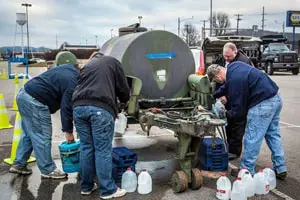 The January 9 chemical spill of 4-methylcyclohexane methanol (MCMH) into the Elk River near Charleston, West Virginia, from storage tanks at Freedom Industries, has left continuing health and safety concerns, even after the lifting of the water use ban.
The January 9 chemical spill of 4-methylcyclohexane methanol (MCMH) into the Elk River near Charleston, West Virginia, from storage tanks at Freedom Industries, has left continuing health and safety concerns, even after the lifting of the water use ban.
More than 300,000 residents in nine counties fell under the ban, with the West Virginia Department of Health and Human Resources declaring that exposure to the chemical can cause “severe burning in throat, severe eye irritation, non-stop vomiting, trouble breathing or severe skin irritation such as skin blistering,” ThinkProgress.org reports. In the days after the spill, area hospitals saw a significant increase in chemical-related visits: 20 people were admitted to hospitals and 411 were treated and released by emergency departments. Calls to the poison control center were up sharply.
Little is known about MCMH, a chemical used in coal processing, and residents and officials worry about long-term adverse health effects. Although the water ban has been lifted, Rahul Gupta, health officer for the Kanawha-Charleston Health Department, told the Charleston Daily Mail that his department is not declaring the water safe. “West Virginia American Water is saying it’s safe. We are taking their word for it.”
After the ban was lifted, the health department advised pregnant women to continue drinking bottled water until there were no longer detectable levels of MCMH in the water system. The Centers for Disease Control and Prevention (CDC) helped develop this advisory. But the CDC’s declared safety threshold of 1ppm (part per million) for MCMH is based on very limited information, including a study that tested only the main ingredient, 4-MCMH. Evan Hansen, an environmental consultant, told ThinkProgress that officials do not know if the ingredient tested is actually the most dangerous one. Many residents say they will continue to use bottled water.
On January 21, Freedom Industries disclosed that an additional chemical, PPH, had spilled into the water but would not give the exact composition of the substance, saying it is “proprietary,” according to the Charleston Gazette. Since the initial disclosure, the company has twice amended upward the amount of MCMH believed to have spilled, from 5,000 gallons to 7,500, to 10,000 gallons.
Rafael Moure-Eraso, chairman of the U.S. Chemical Safety Board, said the investigation into the spill could take up to a year. He warned of the dangers of the chemicals, noting that they were created “to be reactive and to do chemical work. Even in small quantities, they have the potential to affect human beings.” He said they “should not be in drinking water period, at any level,” according to ThinkProgress.